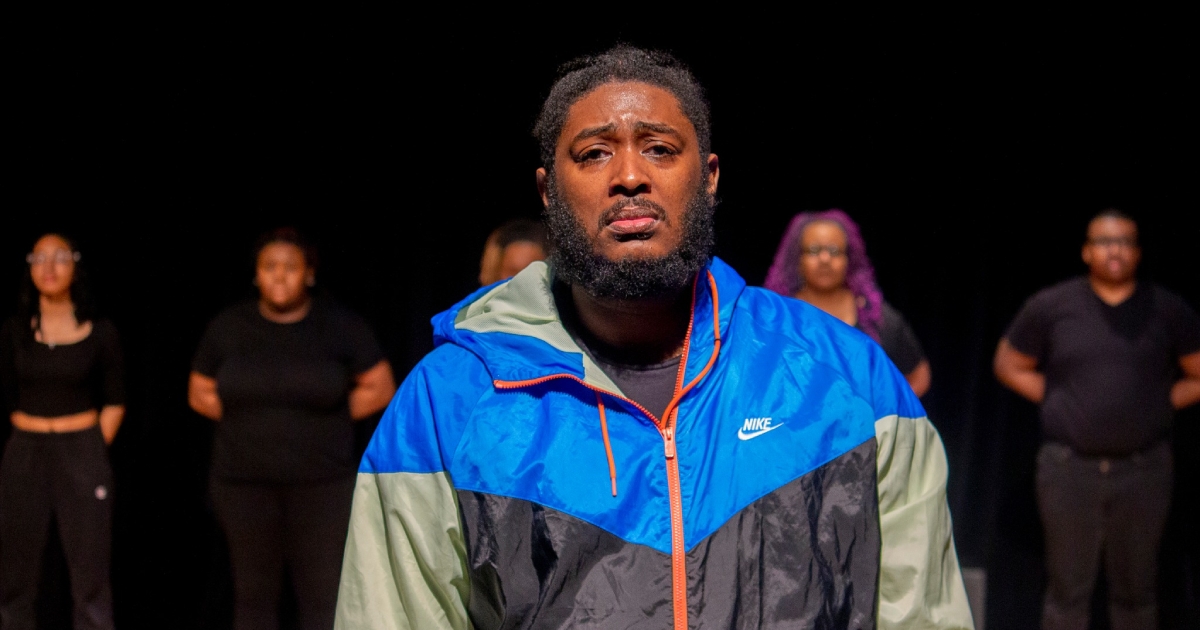To say that What to Send Up When It Goes Down by Alesha Harris is a powerful piece of theatre—or even that it is theatre unlike anything you’ve likely seen before—is an understatement.
Though it is a 90-minute show of beautifully crafted and performed vignettes in a theatre that takes audience members as well as performers on collective as well as individual thought-provoking and emotional journeys, it also breaks the fourth wall; asks the audience to breathe, scream, sing, and write with and for those on stage; and declares itself a pageant, a ritual, an homage, a parody, an interruption, a facilitated conversation, and a safe space for cultural discourse—by and for Black people—that also welcomes respectful audience members who aren’t Black.
And as it’s produced by Face Off Theatre Company at the Jolliffe Theatre in downtown Kalamazoo, it’s all that and more.
Executive Artistic Director Marissa Harrington describes the show in her program note as “a collective reckoning around the physical and spiritual deaths of black bodies” that “calls us into ritual together as we honor the lives of those lost.” And Director Shea-Lin Shobowale-Benson wrote that the production is “black movement and black energy in black space.” Both the intention and the effect are profound.
The experience begins in the lobby when audience members are handed a notecard, pen, a short in memoriam for Irvo Otieno, a Black man killed by law enforcement in Virginia last month, and a black ribbon to wear, in mourning and remembrance of those lost to racial violence.
We chant Irvo’s name 28 times, once for every year he lived. We hear the names we recognize from tragic news stories of the recent past: Breonna Taylor, George Floyd, Trayvon Martin, are but a few. We are given dates, events, and locations from 100 years ago of Black people murdered in this country for being Black. Each of whom, we’re told, were “killed by more than the hand of his killer.” They were “killed by an idea.”
And we’re not alone in the theatre, those of us who can see each other. We are told, we feel, we know we’re surrounded by ghosts.
There is deep grief, trauma, and rage here, and expressed in a way that effectively invites collective healing.
There is also terrific joy, connection, beauty and hilarity. Snippets of comedic vignettes are returned to again and again, such as “Fixing Miss,” a very funny parody of the well-intentioned yet delusional “liberated and educated” white woman (Kelsi Beverly) who denies her privilege, with a Black “driver” (Michael David Arnold) who’s “afraid of being sucked into the margins” and constantly trying to appease her, as well as the quietly rage-filled Black maid, “a woman of her own devising” named Made (Zaynee Miller), who hilariously plots to kill the patronizing white woman who won’t stop asking her in a “Southern dialect not unlike Paula Deen’s” about her children. We come to find out the harrowing reason these questions inspire such justifiable rage.
There are other surreal fantasies, such as the Black woman who, in response to her white coworker’s declaration that he doesn’t see color, tears the mouth right off his face and keeps it in her purse. And the Black woman whose white friend occasionally eats her fingers out of a bucket of popcorn and to ensure the white friend doesn’t feel bad about it, she eats herself, too. A harrowing metaphor.
Director Shea-Lin Shobowale-Benson has made the most of this wonderfully inventive play with very simple technical elements, including wonderfully effective lighting design by Dakota Fontes. Shobawale-Benson also put together an incredibly talented cast who make up this excellent ensemble that includes, in addition to the aforementioned performers, Xavier D. Bolden as an impassioned M.C. among other powerful roles, Brittany Reed-Allen, whose poignant intermittent monologue “Remember when I tried to love you?” is devastating in its realness, Khadijah Brown, whose singing is some of the most glorious glue of the whole endeavor, and Brie Brown, whose call-and-response leadership and performances as other characters, are masterful.
They are each distinct and named, deliberately so—with their actual names as well as the characters they play. The performances are so committed, so real, it’s as if they’re not acting. No doubt this is by design, both by the playwright and the director, and the effect is phenomenal. Their work here is artful to be sure, and the stakes for the characters are as real as the stakes are for the actors—and much of the audience, for this is both lived and performed experience.
“Well go to church, then!” cried out one Black audience member toward the end of the show, again destroying the fourth wall as intended, entering the space of the stage with her voice. Such is the powerful effect of this performance on the Black folk in attendance, the people for whom this show is designed to serve.
And for those few audience members who weren’t Black, myself included, it felt like a privilege indeed to be welcomed into the space and bear witness to this deeply emotional, embodied experience of what it means to be Black in a white supremacist culture that is killing you physically, psychically, spiritually.
By the time the audience members who weren’t Black were asked to step into the lobby at the end of the show to leave the final catharsis for the community of Black people still inside the theater, we understood the importance of their having that truly safe space, perhaps more deeply than we had before the metaphorical curtain went up. And that the work is ours to help make much more of our shared world a safe space for Black people.
What To Send Up When It Goes Down
Face Off Theatre
Apr. 13-16
https://www.faceofftheatre.com/what-to-send-up-when-it-goes-down.html





